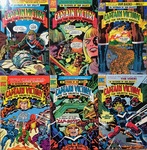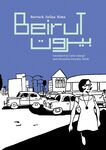
A new NYRB edition of Tove Jansson's Sun City, her only book set in the USA!
Here's NYRB on it:
translated from the Swedish by Thomas TealIn The Summer Book and The True Deceiver, as in her many short stories, Tove Jansson was drawn again and again to the everyday life of the aged. Not as a group apart but as full-blooded people with as many jealousies, urges, and joys as any other group. It’s no wonder that in her travels through America in the 1970s she became fascinated with what was then a particularly American institution, the retirement home, where older people live in their particular tightly knit worlds.
In Sun City, Jansson depicts these worlds in a group portrait of residents and employees at the Berkeley Arms in St. Petersburg, Florida. As the narrative moves from character to character, so the characters move through an America riven by cultural divides, facing the death of its dream. The Berkeley Arms’s newest resident finds a place among the rocking chairs and endless chatter on the veranda, while other residents long for past glories, mourning their losses and killing time. Meanwhile one of their attendants, Bounty Joe, is eagerly awaiting a letter, or even just a postcard, alerting him to the imminent return of Jesus Christ. “Nobody’s normal anymore,” as the bartender says, “not the old geezers and not the newborn kids.”
Additional Book InformationSeries: NYRB Classics
ISBN: 9781681378657
Pages: 224
Publication Date: February 18, 2025
An affectionate, wide-ranging look at a home in St. Petersburg, Fla., from its residents and employees to its peculiar moral code.... The book’s real pleasure comes in its oddball composite character study, like a community kazoo orchestra.
—Joumana Khatib, The New York Times Book Review
Sun City has an acid authenticity, and I find myself feeling that Tove Jansson must know St. Petersburg personally. Set next to The Summer Book, it is an indictment of the American way of old age. . . . It is a book which ought to be read.
—Madeleine L’Engle
Her style is not at all 'poetic'—quite the contrary. It is prose of the very highest order; it is pure prose. Through its quiet clarity we see unreachable depths, threatening darkness, promised treasures.
—Ursula K. LeGuin, The Guardian
Jansson is ... content to let the narrative almost disappear into what Hegel called the "prose of the world": the beauty of the day-to-day. It is here ... that we find the true meaning of the novel.
—Andreas Campomar, The Times Literary Supplement
These are complicated people and Jansson demonstrates, with compassion and irony, how difficult it is for them to maintain their integrity in the face of indignities of growing old.... Her perceptions are crystalline and correct. Children live in the future, and the old live in the past, and Jansson understands this very well. Death is always in the air of Sun City—but this is a book of life and hope.
—Chicago Daily News
That there can still be as-yet untranslated fiction by Jansson is simultaneously an aberration and a delight, like finding buried treasure, especially when the translator is as well suited to her resonant, minimal style as Thomas Teal…. Jansson's own texts are always honed to perfection, given a lightness that proves deceptive, an ease of surface which, like ice over a lake, allows you rare access to something a lot riskier and more profound.
—Ali Smith, The Guardian
Jansson’s sentences are imbued with clarity and mystery in equal measure.
—Matthew Jakubowski, The Kenyon Review
She infuses the awesome mystery of existence, its mix of joy, sorrow, wonder, and pain, into even her most buoyant writing and illustrations.
—Evan James, The Yale Review
Jansson has a knack for packing a good deal of wit and wisdom into ostensibly simple tales.
—Olivia Laing, The Guardian













